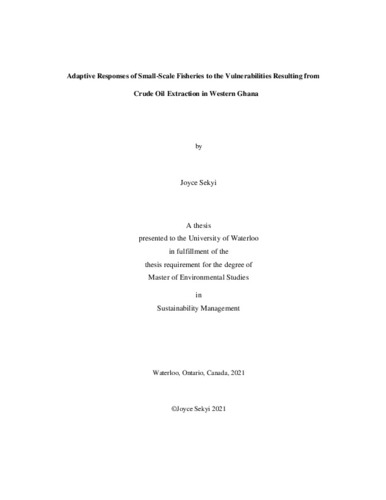| dc.description.abstract | Offshore crude oil exploration activities affect marine-based occupations, including fishing.
These activities lead to the loss of biodiversity, natural resources, and income. In many areas,
fishing entrepreneurs/ professionals along the fish value chain have raised concerns ranging
from declining fish catch to loss of properties and restricted access to fishing grounds. These
issues require attention to promote resilience and support a transition of small-scale fisheries
from vulnerability to viability. Previous research has focused on vulnerabilities fishers face as
a result of crude oil extraction. However, limited knowledge exists on the adaptive responses
used by small-scale fisheries (SSF) in response to vulnerabilities of crude oil extraction.
Hence, in this research, the study aimed to 1) explore the extent of oil and gas activities in the
Western Region of Ghana and the nature of Akwidaa SSF’s in the Western region of Ghana.
Specific attention is on the impact of oil and gas activities on fisher livelihoods; 2) investigate
the vulnerabilities SSF face due to crude oil production in Ghana; 3) provide an in-depth
understanding of the adaptive responses available to SSF transitioning from vulnerability to
viability.
The study employed a Description and responses and Appraisal for Typology (IADAp-T)
approach to extensively review and assess existing literature on vulnerabilities affecting SSF,
their institutions, and various adaptation strategies that have been devised in the past in the
face of growing oil and gas activities.
The results from the assessment of past studies revealed that SSF is impacted by conflicts, low
fish catch and increased social vices. Other impacts include environmental pollution and
increased cost of accommodation and living expenses. These impacts have caused loss of income and the inability of SSF to provide for their families. In addition, the decreasing
standard of living has led to a loss of livelihood resilience, declining well-being, and lack of
capital.
In response to these vulnerabilities, fishing groups resort to short- and long-term coping
strategies. Livelihood intensification and diversification to enhance fishing efforts have been
used in the past by fishers. Other adaptive responses include increased access to capital (social,
natural, physical, financial, and cultural). Sustainable fisheries policy and participation,
community mobilization, migration and education have proven successful in responding to
stressors and enhancing the resilience of small-scale fisheries. The study recommends an
improved avenue for representation of SSF in policymaking and development, enhanced
access to capitals, capacity building and training and strict environmental regulations to
improve well-being and resilience. Further studies on these strategies can strengthen
communities and provide possible pathways for transitioning to viability. | en |

